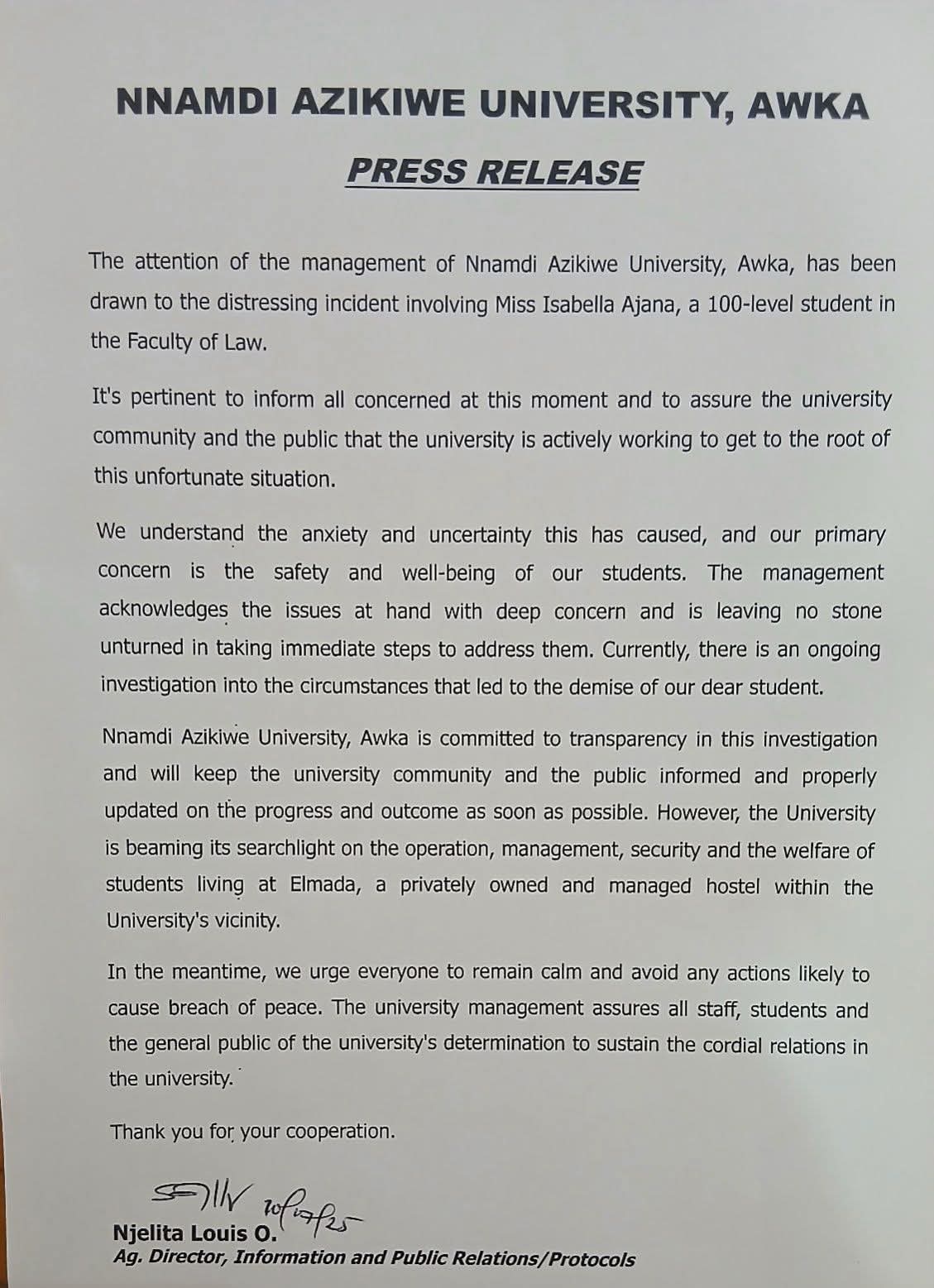Awka, Anambra State, Nigeria — A heartbreaking tragedy has struck Nnamdi Azikiwe University (UNIZIK) in Awka, Anambra State, where a promising 100-level law student, Ajana Chioma Isabella, lost her life in a preventable incident linked to a hostel policy dispute. The incident, which occurred on July 7, 2025, has sparked widespread outrage among students, alumni, and the broader Nigerian community, raising critical questions about institutional policies, access to essential medications, and the value of human life in academic settings. Reports indicate that Ajana, a chronically diabetic student, was denied access to her insulin due to a hostel regulation requiring a payment of N120,000 for a spare room key after she misplaced her own. This delay in accessing her life-saving medication led to a diabetic shock, ultimately resulting in her untimely death.
The sequence of events leading to Ajana’s death began mundanely a lost key but escalated into a nightmare of bureaucratic heartlessness. Ajana, a resident of the privately owned Elmada Hostel near UNIZIK’s campus, relied on daily insulin injections to manage her Type 1 diabetes. On Monday, she and her two roommates discovered they had misplaced the key to their room, where Ajana’s insulin was stored. As her blood sugar levels began to rise, panic set in. Insulin deprivation for diabetics can trigger diabetic ketoacidosis (DKA), a life-threatening condition that causes organ failure, coma, and death within hours if untreated.
The students rushed to their hostel mistress, identified only as "Madam Bright," pleading for the spare key to retrieve Ajana’s medication. What followed was a chilling display of indifference. According to multiple eyewitness accounts from Elmada residents, Madam Bright refused to hand over the key unless the students paid ₦120,000—₦40,000 from each roommate citing a strict hostel policy for lost keys. Despite desperate explanations of Ajana’s deteriorating condition and their inability to immediately raise the sum (equivalent to two months' rent for many students), Madam Bright reportedly dismissed them.
Unable to retrieve her insulin for three days, Ajana’s health deteriorated rapidly, culminating in a diabetic shock that proved fatal. She experienced severe vomiting, labored breathing, and confusion classic signs of DKA. With no access to insulin, her roommates frantically pooled resources but could not scrape together ₦120,000. By the time they sought alternative help, Ajana had collapsed. She was rushed to a nearby hospital but died en route. Medical staff later confirmed she succumbed to complications from acute hyperglycemia (high blood sugar), directly linked to the delayed insulin dose.
Diabetes, particularly Type 1, requires consistent and timely administration of insulin to regulate blood sugar levels. Failure to access this medication can lead to severe complications, including diabetic ketoacidosis, a life-threatening condition that can cause organ failure and death. For Ajana, the inability to access her insulin was not due to a lack of medication but rather an administrative barrier that prioritized policy over human life. The hostel’s insistence on the exorbitant fee for a spare key has been widely criticized as insensitive and inhumane, with many questioning how such a policy could take precedence over a student’s urgent medical needs.
The incident has highlighted a broader issue of rigid bureaucratic systems in Nigerian universities, where rules and regulations often lack flexibility to accommodate emergencies. In Ajana’s case, the hostel management’s refusal to make an exception for a medical emergency has been described as a gross failure of duty of care. Students and advocates argue that hostel staff should have been trained to recognize the severity of medical conditions like diabetes and to prioritize student safety over financial penalties.
Within hours, protests erupted. Hundreds of UNIZIK students marched through campus, brandishing placards with slogans like "₦120,000 FOR A LIFE?" and "JUSTICE FOR AJANA." Social media exploded with #JusticeForAjana, amplifying calls for Madam Bright’s arrest and the shutdown of Elmada Hostel. Students revealed this wasn’t an isolated incident: Elmada had a history of exploitative fees, from ₦50,000 for "late rent" to ₦30,000 for broken furniture.
This is beyond negligence; it’s inhuman," declared Chika Obi, a fellow law student. "A young woman died because someone put money above human life. Madam Bright watched her suffer and did nothing. That’s murder.University’s Tepid Response and a Missing Suspect
UNIZIK officials issued a brief statement confirming an "investigation" but provided no timeline or concrete actions. The hostel mistress, Madam Bright, has vanished. Elmada Hostel now stands empty, its gates locked, as police search for her. Students accuse the university of complicity, noting that UNIZIK routinely ignores complaints about unregulated private hostels.
The Chief Safety Officer at UNIZIK, Ken Chukwurah, confirmed that the university is investigating the incident but provided no further details, stating, “We are still investigating to be sure of what happened, how it happened and the proper identity of the victim.” This response has been criticized as inadequate, with students demanding transparency and swift action to address the systemic issues exposed by Ajana’s death.

A Promising Life Cut Short
Ajana Chioma Isabella was a bright and ambitious young woman who had just begun her journey in the Faculty of Law at UNIZIK. Described by peers as dedicated, intelligent, and full of potential, Ajana was known for her passion for justice and her dream of becoming a legal advocate for the marginalized. Her diagnosis of diabetes, a chronic condition requiring daily management, did not deter her from pursuing her academic and professional aspirations. However, the events leading to her death have cast a shadow over her promising future and exposed systemic flaws in the university’s hostel management.
Diabetes and the Challenges of Access to Medication
Ajana’s death underscores the broader challenges faced by individuals living with diabetes, particularly in low-resource settings. In Nigeria, access to insulin and other essential medications can be hindered by financial constraints, inadequate healthcare infrastructure, and societal stigma. For students like Ajana, who rely on daily medication to survive, any delay or barrier to access can have catastrophic consequences. According to the International Diabetes Federation, Nigeria has one of the highest burdens of diabetes in Africa, with over 1.5 million people affected. Yet, the cost of insulin and other supplies remains prohibitively high for many, exacerbating health disparities.
The incident at UNIZIK also raises questions about the responsibility of educational institutions to support students with chronic illnesses. Universities are expected to provide a safe and inclusive environment for all students, including those with medical conditions. This includes ensuring that emergency protocols are in place to address situations where access to medication is critical. The failure to do so in Ajana’s case has led to accusations of negligence and a call for universities nationwide to implement mandatory training for staff on handling medical emergencies.
The tragedy at UNIZIK is not an isolated incident but part of a broader pattern of institutional failures in Nigeria’s education and healthcare systems. Similar cases have been reported in other universities, where rigid policies and lack of empathy have led to preventable harm. For instance, in June 2025, another UNIZIK student died after jumping from a three-storey building, allegedly under the influence of hard drugs, highlighting the need for better mental health and emergency response systems on campus.
Read More
- The Best Data Plans in Nigeria for July 2025: Top Deals Reviewed
- MultiChoice Hit with N766m Fine for Data Privacy Violations
- How a Yahoo Boy Masterminded a $250,300 Scam Targeting Trump Donors: Inside the Audacious Heist
- VDM Releases Zlatan Voice Note on Mohbad's Death
- Can you Really Profit from AC Water?

